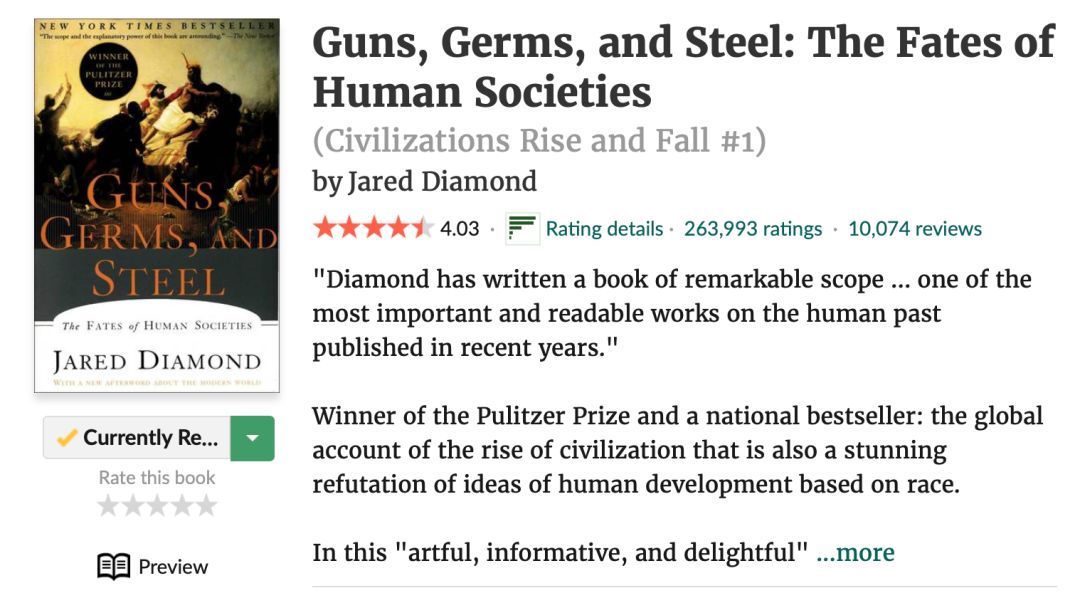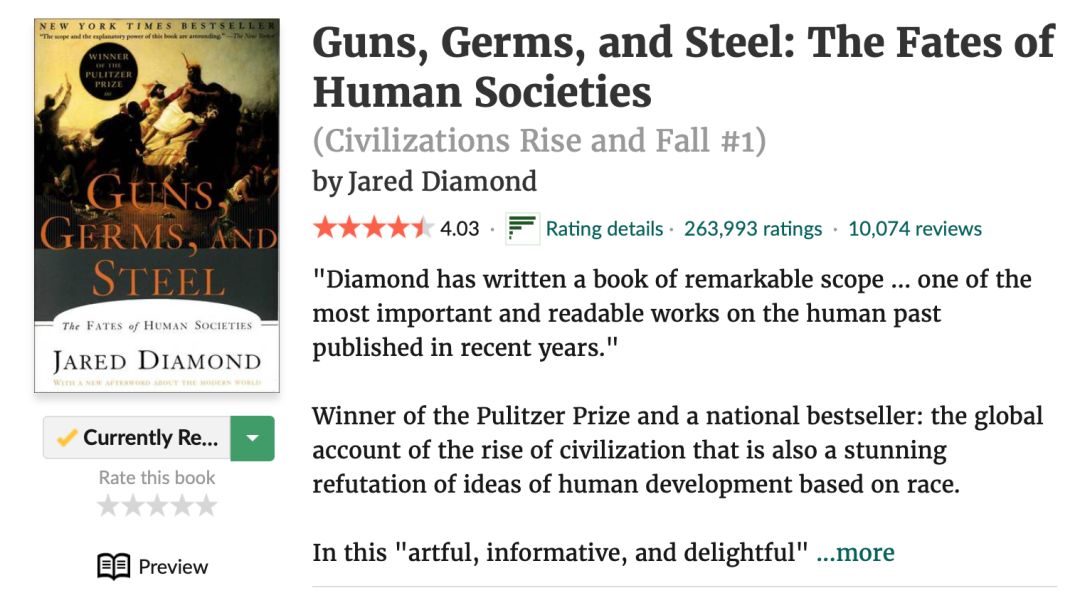开始早读
很早一个原因是先安排一个比较规律的时间安排。
今天开始读了Guns, Germs, and Steel: The Fates of Human Societies, 以下是Goodreads 对于图书的介绍

97 年出版的第一版,拿了98年的普利策奖。
全书,笼统归纳,回答了为什么欧亚文明(主要是欧+美)主导了现代社会?
表面原因是题目所说的 Guns, Germs (比如对于北美原住民致命打击的smallpox), and Steel。
但是进一步的问题就是,为什么西方有了这些东西?
今天读了前沿的部分,以下是精选:
Preface
WHY IS WORLD HISTORY LIKE AN ONION?
I seem to view world history as an onion, of which the modern world constitutes only the surface, and whose layers are to be peeled back in the search for historical understanding.
先说世界历史是一层层展开的,想洋葱,看到的是表明,要了解,就需要一点点剥开
Why did history unfold differently on different continents?
为什么不同大陆的发展会不同?
“The usual answers to that question invoke proximate forces, such as the rise of capitalism, mercantilism, scientific inquiry, technology, and nasty germs that killed peoples of other continents when they came into contact with western Eurasians. But why did all those ingredients of conquest arise in western Eurasia, and arise elsewhere only to a lesser degree or not at all?”
“All those ingredients are just proximate factors, not ultimate explanations.” 什么资本主义、科技发展,更多是表面的。
Prologue
Yali‘s Question
Who is Yali?
In July 1972 I was walking along a beach on the tropical island of New Guinea, where as a biologist I study bird evolution. I had already heard about a remarkable local politician named Yali, who was touring the district then. 是作者在新几内亚认识的一个原住民
What is the question ?
“Why is it that you white people developed so much cargo and brought it to New Guinea, but we black people had little cargo of our own?” 为什么西方人有这么多物质文明,但是新几内亚当地人没有。
Rephrase 这个问题可以进一步理解为
Why did wealth and power become distributed as they now are, rather than in some other way? 为什么有当下的发展格局
Why did human development proceed at such different rates on different continents? 为什么不同大陆的发展节奏不同
以下是作者反驳的观点
Does the differences arose from differences in innate ability, such as cognitive ability or intelligence? 这种不同是因为人种内在的差别吗?
People from traditional societies like New Guinea maybe smarter . 不是,如果真要说聪明,作者觉得原始的生活方式让人类更为聪明
– “First, Europeans have for thousands of years been living in densely populated societies with central governments, police, and judiciaries. In those societies, infectious epidemic diseases of dense populations (such as smallpox) were historically the major cause of death, while murders were relatively uncommon and a state of war was the exception rather than the rule.” 现代人类是一批从病毒抗体里挑出来的,所以抵抗力是比较好,但是脑子不见得好
– “Modern European and American children spend much of their time being passively entertained by television, radio, and movies. In the average American household, the TV set is on for seven hours per day. In contrast, traditional New Guinea children have virtually no such opportunities for passive entertainment and instead spend almost all of their waking hours actively doing something, such as talking or playing with other children or adults. Almost all studies of child development emphasize the role of childhood stimulation and activity in promoting mental development, and stress the irreversible mental stunting associated with reduced childhood stimulation. This effect surely contributes a non-genetic component to the superior average mental function displayed by New Guineans.” 另外现代人的生活方式是无脑的,而原始生活方式不断在健脑
以下是作者认同的观点
What is the reason?
“AUTHORS ARE REGULARLY asked by journalists to summarize a long book in one sentence. For this book, here is such a sentence: “History followed different courses for different peoples because of differences among peoples’ environments, not because of biological differences among peoples themselves.” 和生活的环境会有关系,但是具体环境是怎么影响的呢?
明天上午读第一章
目前大多数的阅读活动是主讲人代替阅读的形式。这个过程对于听众来说只是听了一些信息。不算是真的阅读了。
另外主讲人可能省略掉了很多的中间推导过程,而仅仅分享了结论。所以对于听众来说哪怕接收到了信息,也很难去理解和用这个信息。
另外我们阅读的只有都或多或少有自己带入的习惯,导致不同的书,不同的读者有不同的理解。哪怕non-fiction 的书有时也会有类似的问题。
所以说实话,我没太想好到底要怎样的形式是更为合适的,但是我想的是上面我说的这种形式是我不想要的,所以今天上午的时候我就愣头青的一句一句的精读,导致一个小时过去了,只完成了两个前言。
从明天开始会有所改变,会以段落为单位阅读。
当然因为还在发展过程中,所以形式都还未落定,大家参与时候有什么建议的也可以提出来。
以下是明天早读的直播入口
活动目前是公益性质的
(电子或者纸质书籍需要读者自己安排购买)

反馈沟通 微信labhugo
本文源自微信公众号:LABcircle
